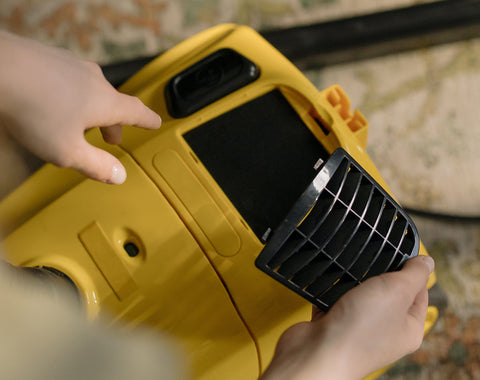
Replacing your air filter is an important part of maintaining your vacuum cleaner. A clogged air filter will block suction power, making it more difficult for your vacuum to suck up dirt and dust, leading to a decrease in its efficiency. There are several different types of air filters available for vacuum cleaners, and each one has a specific purpose. In order to ensure that you are using the correct air filter for your vacuum, it is important to consult your owner's manual.
When your vacuum cleaner starts acting unusual, it's understandable for it to cause a great deal of anxiety, especially if you don't understand the mechanics of a vacuum cleaner. They are not among the cheapest appliances. Thinking about pinning the cost of a vacuum repair on top of what you already paid for is stressful. But don't panic yet - if you're here because your vacuum cleaner is acting up, it's possible that all it needs is a filter replacement.
Let's go over which types of air filters your vacuum cleaner might have and learn how you can tell if the filter needs to be replaced.
When to Replace Your Vacuum Filter
First, let's establish that most vacuum cleaners need to be maintained and have their air filters replaced. You should be aware of which type of filter your vacuum model has and where it is located because truthfully, they should be replaced often. Some people run into issues when they purchase a vacuum cleaner and don't realize that they even have a filter they need to replace.
It is important to check your vacuum filter regularly and replace it when necessary. A clogged air filter will decrease the suction power of your vacuum cleaner and make it less effective at removing dirt and dust from your home. You should replace your air filter at least once every three months, or more often if you have pets or live in a dusty environment.
If you’re experiencing any of these issues after vacuuming, it may be time for a new air filter:
- Your vacuum doesn't seem to be picking up as much dirt as it used to.
- The air coming out of your vacuum smells bad.
- Your vacuum is making more noise than usual or sounds different.
- You can see dust blowing out of the air vent.
- You or someone in your home is having allergy or asthma symptoms right after vacuuming.
There are different types of air filters for vacuum cleaners, and each one needs to be replaced at different intervals. Let's start with the most popular vacuum air filter:
HEPA Vacuum Filter

The most common type of air filter used in vacuum cleaners is the HEPA filter. HEPA filters are designed to remove dust and pollen from the air, and they are especially effective at trapping small particles. If you have allergies or asthma, a HEPA air filter is an important part of your vacuum cleaner.
Most vacuum cleaners on the market today utilize HEPA filters unless it is a very old model. HEPA is the most efficient filter for particle removal and will capture the majority of it. They are exactly the same as air purifier filters, only repurposed for use with a vacuum cleaner.
HEPA filters for vacuum need to be replaced every 3 to 6 months. Some newer models have an indicator light that will tell you when the filter needs to be replaced. If you locate the filter cartridge, you'll find that a clean HEPA filter is white. If you hold it up to a lightbulb or flashlight and you can see through it, then it shouldn't need to be replaced yet.
Foam Vacuum Filter
Foam air filters are made of a porous material that allows air to pass through while trapping dust and dirt. Foam filters are often used in conjunction with other types of air filters, such as HEPA filters.
Foam filters need to be replaced every 1 to 3 months. You can tell when a foam filter needs to be replaced because it will be discolored and covered in dirt.
Felt Vacuum Filter
Felt air filters are made of a dense material that traps large particles of dust and dirt. Felt air filters are often used in vacuum cleaners with powerful suction, such as commercial-grade vacuum cleaners.
Felt filters need to be replaced every 3 to 6 months. Foam and felt filters usually come in a package together; if you use one, chances are you are using both. They work together, and sometimes they are even replaced at the same time. It all depends on your vacuum model.
Pre-Motor Vacuum Filter
Pre-motor air filters are located between the air intake and the motor of the vacuum cleaner. These air filters trap dust and dirt before it has a chance to reach the motor, keeping the vacuum cleaner running smoothly. Both pre- and post-motor filters, as the name indicates, focus solely on the protection of your vacuum motor (engine). It is meant to keep flying dust particles away from it and to keep the area clean.

When these airborne particles repeatedly hit the engine at such high speeds, they can clog and slowly inflict damage. Motor filters are directly related to the longevity of your vacuum cleaner.
Post-Motor Vacuum Filter
Post-motor air filters are located after the motor of the vacuum cleaner. These air filters trap any dust or dirt that escapes from the other air filters in the vacuum cleaner.
Motor filters should be replaced together every 3 to 6 months.
Conclusion
The air filter is a key component in your vacuum cleaner. It helps to keep dust and dirt on the carpet from coming back up into the air, which can affect allergies or asthma symptoms. There are several different types of air filters, and each has a different function. Knowing which air filter your vacuum needs can help you keep your vacuum running smoothly and efficiently.








